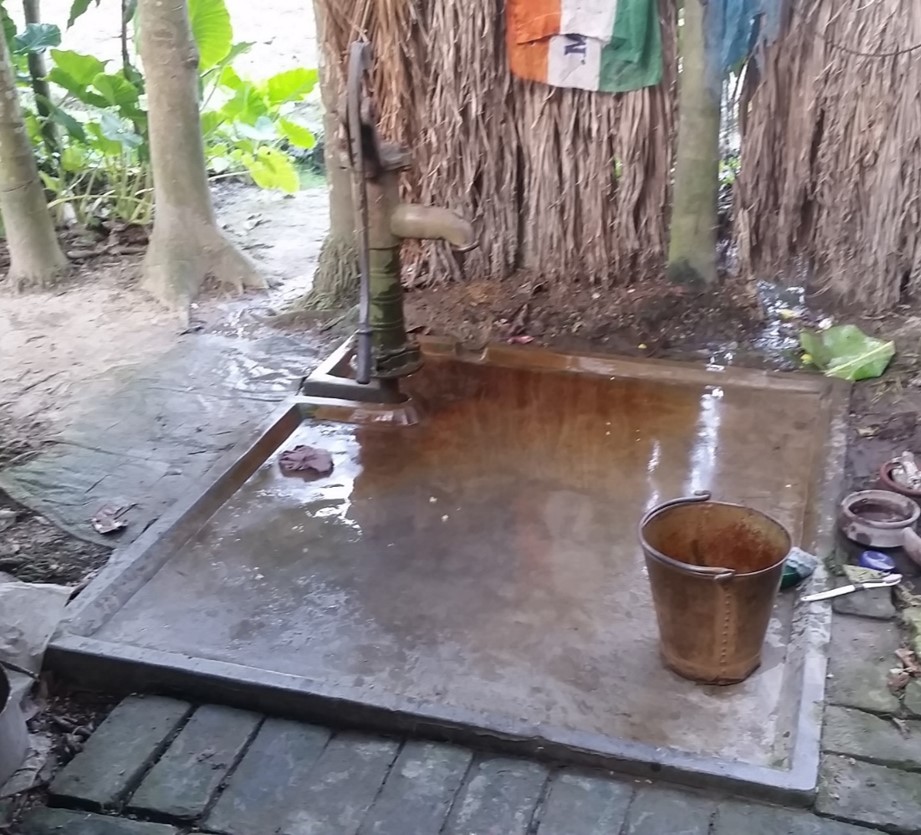 We have conducted field work in the West Bengal area to test our ImpAs resin in close collaboration with BioNanoConsulting and CGCRI Kolkata. Two wells were sampled in the village of Sahispur, in the Nadia district of West Bengal, India. Tube wells were pumped for 6 to 15 minutes to remove stagnated water, depending on how frequently wells were used. Opaque plastic bottles were used to prevent photooxidation of As(III). Groundwater samples were immediately spiked with 10 mM EDTA, which is commonly employed to prevent iron precipitation, which would both risk loss of arsenic through coprecipitation and adsorption, and potentially block the resin syringe filters. Samples were then passed through 0.45 μm nylon syringe filters to remove solid particulates which might otherwise adsorb or release arsenic, and bacteria which might
We have conducted field work in the West Bengal area to test our ImpAs resin in close collaboration with BioNanoConsulting and CGCRI Kolkata. Two wells were sampled in the village of Sahispur, in the Nadia district of West Bengal, India. Tube wells were pumped for 6 to 15 minutes to remove stagnated water, depending on how frequently wells were used. Opaque plastic bottles were used to prevent photooxidation of As(III). Groundwater samples were immediately spiked with 10 mM EDTA, which is commonly employed to prevent iron precipitation, which would both risk loss of arsenic through coprecipitation and adsorption, and potentially block the resin syringe filters. Samples were then passed through 0.45 μm nylon syringe filters to remove solid particulates which might otherwise adsorb or release arsenic, and bacteria which might  otherwise oxidise or reduce arsenic. Samples were subdivided and then spiked with As(V) and As(III) stock solutions to give a wide range of As(III):As(V) ratios. The first half of each subsample was collected without further treatment (for ASV determination of Total As and As(III), and for ICP-MS determination of Total As), whilst the second half was passed through a syringe loaded with 1 gram ImpAs (for resin/ICP-MS determination of iAs(III)). Whilst EDTA is claimed to preserve arsenic speciation, samples were also spiked with 40 μM hydrazine to prevent oxidation of iAs(III). Samples were analysed for iAs(III) and Total As in the field by ASV with the PDV6000ultra according to the developed method. Groundwater samples preserved with EDTA and hydrazine were taken back to the lab for repeats of the As(V) spike experiments where samples were treated with resin loaded syringes up to 6 times.
otherwise oxidise or reduce arsenic. Samples were subdivided and then spiked with As(V) and As(III) stock solutions to give a wide range of As(III):As(V) ratios. The first half of each subsample was collected without further treatment (for ASV determination of Total As and As(III), and for ICP-MS determination of Total As), whilst the second half was passed through a syringe loaded with 1 gram ImpAs (for resin/ICP-MS determination of iAs(III)). Whilst EDTA is claimed to preserve arsenic speciation, samples were also spiked with 40 μM hydrazine to prevent oxidation of iAs(III). Samples were analysed for iAs(III) and Total As in the field by ASV with the PDV6000ultra according to the developed method. Groundwater samples preserved with EDTA and hydrazine were taken back to the lab for repeats of the As(V) spike experiments where samples were treated with resin loaded syringes up to 6 times.
Be First to Comment